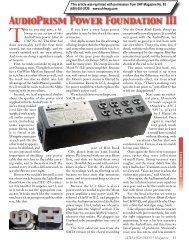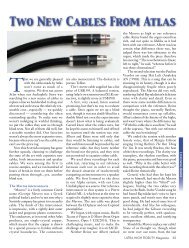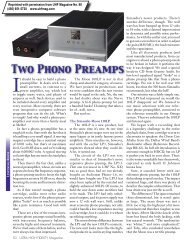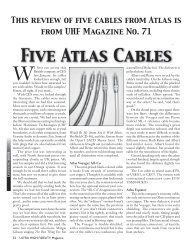download the PDF version - Ultra High Fidelity Magazine
download the PDF version - Ultra High Fidelity Magazine
download the PDF version - Ultra High Fidelity Magazine
You also want an ePaper? Increase the reach of your titles
YUMPU automatically turns print PDFs into web optimized ePapers that Google loves.
Software<br />
Record Reviews<br />
Brahms Sonatas for Cello and Piano<br />
Dyachkov/Saulnier<br />
Analekta FL 2 3167<br />
Lessard: Brahms wrote very few cello<br />
sonatas — just six by my count — but<br />
all of <strong>the</strong>m deserve our admiration.<br />
You’ll find three of <strong>the</strong>m on this disc,<br />
masterpieces that unveil <strong>the</strong> composer’s<br />
tender romantic side, played here by two<br />
talented artists: cellist Yegor Dyachkov<br />
and pianist Jean Saulnier.<br />
The sound is so good that <strong>the</strong> timbres<br />
of both <strong>the</strong> cello and <strong>the</strong> piano are perfectly<br />
reproduced, and you discover with<br />
delight <strong>the</strong> very close rapport between<br />
<strong>the</strong>se two musicians. Saulnier plays with<br />
precision and fluidity, and is always<br />
expressive. The velvet smoothness of<br />
Dyachkov’s cello, due in equal parts<br />
to technical skill and expressiveness, is<br />
remarkable. An hour of pure delight!<br />
Add this CD to your collection, and<br />
I think you’ll agree. The more often you<br />
listen, <strong>the</strong> more it will win you over.<br />
Premiere Evening<br />
Lowell Graham & American Promenade<br />
Orch.<br />
Klavier KCD 11053<br />
Lessard: On this disc are composers and<br />
works filled with elements that promise<br />
<strong>the</strong> greatest auditory pleasure. It opens<br />
with an unfinished piece by Carl Maria<br />
von Weber, completed many years later<br />
by no less a luminary than Mahler. It<br />
is titled Die Drei Pintos (The Three<br />
Pintos), and this is its premiere recording.<br />
Its melodic lines, of great beauty, are<br />
interpreted masterfully under Graham’s<br />
baton.<br />
Much better known is <strong>the</strong> overture<br />
to Otto Nicolaï’s The Merry Wives of<br />
Windsor, which is absolutely charming,<br />
full of life and irresistible. It begins in<br />
promising fashion, with a breathtaking<br />
melody played by rich, silken strings. But<br />
<strong>the</strong>n <strong>the</strong> perfect moment is shattered by<br />
<strong>the</strong> arrival of <strong>the</strong> tympani, played with<br />
no discernment, and bordering on rage.<br />
It continues in that fashion, and even<br />
becomes worse in <strong>the</strong> celebrated waltz<br />
halfway through <strong>the</strong> overture. Is it <strong>the</strong><br />
conductor’s fault? Is <strong>the</strong> percussion<br />
simply exaggerated by <strong>the</strong> recording? I<br />
know only that <strong>the</strong> result is disastrous.<br />
On <strong>the</strong> o<strong>the</strong>r hand, Édouard Lalo’s<br />
Arlequin, Musique de Carnaval, ano<strong>the</strong>r<br />
premiere recording, will enchant you.<br />
The strings are joined by an intriguing<br />
and mischievous flute that will draw you<br />
right in. There’s a lovely waltz in <strong>the</strong>re<br />
too, but <strong>the</strong>n it’s all over, a scant three<br />
minutes later.<br />
The CD ends with Giovanni Battista<br />
Viotti’s Violin Concerto No. 22, in which<br />
<strong>the</strong> orchestra is joined by soloist Fiorella<br />
Sommer-Link. She has a good violin, <strong>the</strong><br />
Kreutzer, <strong>the</strong> product of Stradivari’s best<br />
period, but once again something has<br />
gone wrong. The violin sounds thin and<br />
shrill, with <strong>the</strong> orchestra overpowering<br />
it in <strong>the</strong> tuttis.<br />
I played this CD several times, I can’t<br />
tell you how many times, but my conclusion<br />
remained <strong>the</strong> same. In most of <strong>the</strong><br />
pieces this normally excellent conductor<br />
has too heavy a hand. I’m not happy<br />
about this, my first negative review of<br />
a Klavier recording. Of course, reviewing<br />
is always a subjective enterprise, and<br />
perhaps you’ll like it better than I did.<br />
Carmin<br />
Bïa<br />
Audiogram ADCD10163<br />
Rejskind: When I mention this new<br />
recording from <strong>the</strong> wonderful Brazilian-French<br />
singer, I’m asked <strong>the</strong> same<br />
question: “Is it as good as <strong>the</strong> previous<br />
two?”<br />
By and large <strong>the</strong> answer is yes, and<br />
it may be even better, but expect it to<br />
be different. The first impression is<br />
that <strong>the</strong>re was more money available<br />
this time. The lush graphics and <strong>the</strong><br />
photos, showing a barefooted and barelegged<br />
Bïa lounging on a red overstuffed<br />
chair on a hilltop, reflect <strong>the</strong> available<br />
budget. So do <strong>the</strong> complex musical<br />
arrangements. Is <strong>the</strong> recording quality<br />
better? It is less intimate, certainly, and<br />
by Reine Lessard<br />
and Gerard Rejskind<br />
Bïa’s textured voice is less forward, with<br />
more natural sibilance. Yet she is not so<br />
far back that we have to strain to make<br />
out what she is singing. Pretty good.<br />
Yet <strong>the</strong> accompaniment is solid, with<br />
a bottom end that reaches to bedrock<br />
when it needs to.<br />
But mere recording quality is not<br />
enough to justify a recommendation.<br />
What about <strong>the</strong> music itself?<br />
I found one disappointment, and<br />
only one. The previous recordings<br />
(titled respectively La mémoire du vent<br />
and Sources) feature wonderful guitar<br />
work by Bïa herself. This time she has<br />
more musicians, and she lets <strong>the</strong>m do<br />
<strong>the</strong>ir work, concentrating on her singing.<br />
I’m glad to report that <strong>the</strong> singing is as<br />
mesmerizing as ever. Her voice is strong<br />
but effortless, with plenty of texture but<br />
no roughness. The rhythms are catching<br />
to <strong>the</strong> point of obsession. The songs,<br />
many of <strong>the</strong>m composed by Bïa herself,<br />
are often superb.<br />
The one that gets <strong>the</strong> most radio play<br />
is Lobo, which has one of those gorgeous<br />
melodies that sticks in <strong>the</strong> mind (it’s in<br />
Portuguese, with a French <strong>version</strong> on an<br />
unannounced track at <strong>the</strong> end). The CD’s<br />
qualities don’t end <strong>the</strong>re, however. Try<br />
to sit still during Mariana, with its rapid<br />
Bossa Nova rhythm. A number of <strong>the</strong><br />
songs are sambas. An example is Je n’aime<br />
pas, worth listening to for <strong>the</strong> words (in<br />
French) as well as <strong>the</strong> music…but don’t<br />
miss <strong>the</strong> final line of <strong>the</strong> text. In <strong>the</strong> more<br />
languorous Helena she is accompanied by<br />
<strong>the</strong> rich and sonorous cello of Emmanuel<br />
Joussemet. There’s a lot of flute on this<br />
album, played by Bïa’s longtime accompanist<br />
Dominique Bouzon. On Dans mon<br />
cœur Bouzon plays a gigantic flute called<br />
an octobasse, which goes down to where<br />
your speakers may or may not choose to<br />
follow.<br />
There’s really not a dull song on<br />
<strong>the</strong> disc, but <strong>the</strong>re are two I can’t avoid<br />
singling out. One is Eu Vi (I saw), a Portuguese<br />
translation by Bïa of a fine old<br />
song by French Caribbean chansonnier<br />
Henri Salvador. The o<strong>the</strong>r, which closes<br />
<strong>the</strong> album, is titled Inti. It is a very old<br />
ULTRA HIGH FIDELITY <strong>Magazine</strong> 65
















